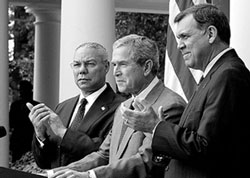Iraq now, Cuba next? (FCN, 10-28-2003)

WASHINGTON (FinalCall.com) – The Cuban people will decide the future of Cuba, not President Bush–so said Cuban officials in response to the President’s call for democratic change on the island nation.
“This is an electoral maneuver to pay a debt of gratitude to those extremists in Miami who supported the President and made possible his election in 2000,” said Lazaro Herrera Martinez, First Secretary to the Cuban Interests Section in Washington, D.C.
He told The Final Call, “This is nothing new. It is the same. It’s a reaffirmation of the aggressive policy against the opinion of the rest of the world, and contrary to the people of America and the Congress. We will triumph.”

Pres. Bush announced October 10 that he was calling for change in Cuba.
“Clearly the Castro regime will not change by its own choice. But Cuba must change,” he declared.
He is proposing that the U.S. reinforce travel restrictions to Cuba that are already in place, increase the number of new Cuban immigrants allowed each year and establish a commission for the Assistance to a Free Cuba. The commission would be co-chaired by Secretary of State Colin Powell and Secretary of Housing and Urban Development Mel Martinez.
“The transition to freedom will present many challenges to the Cuban people and to America and we will be prepared,” said Pres. Bush.
The Cuban people are prepared also.
“We are ready for any action or eventuality. We don’t lose sleep over this. The Cuban people will continue to support our regime of social justice. The only ones to exert influence or decide the future of Cuba is the Cuban people.”
The audience at the Rose Garden when Mr. Bush made this policy announcement was full of Miami Cuban exiles, anti-Castro groups and supporters of Pres. Bush from Congress.
This announcement by the President is considered by some as an appeasement of the politically connected anti-Castro groups for the votes of Cuban Americans in that state that could easily carry influence to the next election, since Florida was key in the 2000 election that was decided by the Supreme Court.
With the President’s brother, Jeb Bush, as governor of the state, many feel an entitlement to policies that favor Cuban exiles and exert pressure to topple Cuban President Fidel Castro.
Pres. Castro has led the country since the revolution in 1959 when many of the exiles fled to Miami. While Pres. Bush claims that numerous countries around the world recognize the oppressive nature of Cuba, for the past 12 years, according to Dagoberto Rodriguez, head of the Cuban Interests Section, the UN General Assembly has urged the United States to lift its trade embargo against Cuba.
This measure is also expected to be approved this year. However, Pres. Bush has vowed to veto any measure introduced by Congress that calls for easing the trade restrictions with Cuba that have been in effect since 1959.
“The Cuban people suffer from the blockade and these policies. This policy does not take into account the real interests and concerns of the American people who want a free exchange of ideas between Cubans and Americans,” said Mr. Martinez.
“It is a sad day when the President takes the will of this bunch of extremists as the basis for this policy. These policies are based on one lie after another.”
USA Today syndicated columnist DeWayne Wickham has traveled to Cuba several times and has taken Black journalists to see firsthand the reality of Cuba, independent of the picture painted by the American media.
“Here we go again,” he told The Final Call. “This is the president who scolded Al Gore during the 2000 presidential campaign about U.S. adventurism abroad. The President said that he wouldn’t venture into nation-building.”
“Yet, he has committed this administration to a course of action that seeks to destroy nations so they will need to be rebuilt. We need to be mindful that the rebuilding is done at the U.S. taxpayers’ expense at a time when unemployment is high and the deficit is growing at warp speed.”












